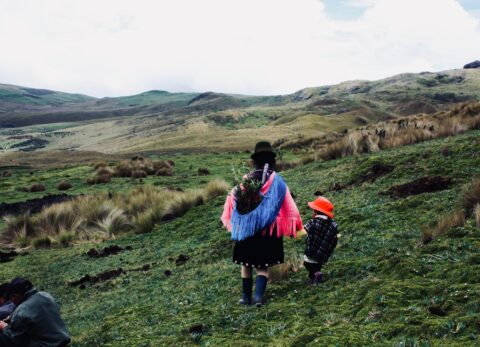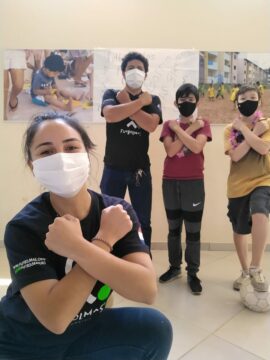Ibero-America works to recognize and guarantee the rights of Afro-descendant populations

Cooperation for racial equality between subnational governments of Uruguay, Brazil and Spain
Inequality is a major obstacle to Latin-America’s sustainable development and to its democracies. Although the first axis of the regions’ social inequality matrix is the socioeconomic stratum, other inequalities that exist and persist are also determined by the axes of ethno-racial status (ECLAC and UNFPA, 2021).
The legacy of exclusion left behind by slavery (estimated in at least 134 million people) is still in evidence today, masking the contributions of Afro-descendant populations to development (ECLAC and UNFPA, 2021). “The current development model, structural racism and an enduring culture of privilege reproduce the structural inequalities, deprivations and rights violations that continue to affect Latin America’s Afro-descendant populations and keep them from achieving well-being” (ECLAC and UNFPA, 2021).
According to the document prepared by the Economic Commission for Latin America and the Caribbean and the United Nations Population Fund (ECLAC and UNFPA, 2021), and based on available data, the incidence of poverty and extreme poverty in Latin-America is much higher among Afro-descendants. Shortcomings related to basic services, lack of access to quality education and health, and major deficits in decent work and social protection stand out among the main challenges. In addition, women and Afro-descendant youth are the most affected by inequality in terms of their access to the labor market.
In recent decades, some Latin-American countries have begun taking steps towards the recognition of Afro-descendant populations as part of their history and culture, while implementing policies aimed at improving their living conditions and guaranteeing their rights (SEGIB, 2020).
“Brazil is one of the countries in Latin-America that has made the most significant achievements to institutionalize policies against discrimination and in favor of racial equity” (SEGIB, 2020). For example, initiatives based on the National Policy for the Promotion of Racial Equality (2003) and the National Plan for the Promotion of Racial Equality (2009), which culminated in the Statute for Racial Equality (2010) and its regulations, stand out. This statute institutionalized a series of initiatives in education, culture, sports, leisure, justice, health, labor and social assistance (Ministry of Women, Family and Human Rights, MDH by its Portuguese acronym, 2021).
In Uruguay’s case, the statistical visibility of ethnic-racial minorities, which began in 2006, shattered the myth that the Uruguayan society was relatively racially homogeneous (UNFPA, 2022), integrated and almost devoid of inequalities (Ministry of Social Development, MIDES by its Spanish acronym, 2019). The Law against Racism, Xenophobia and Discrimination (2004), the Law on Affirmative Actions for Afro-descendants (2013) – in which, for the first time, the State recognizes the discrimination to which the Afro-Uruguayan population has been exposed (MIDES, 2019) – and the First Plan for Racial Equity and Afro-descendants (2019), stand out among the main milestones in public policies on the subject. This plan was discussed with councils throughout the country and its main objectives are to organize and guide public policies for the inclusion of people of African descent, promote their social participation, and incorporate the ethnic-racial perspective in public policies (MIDES, 2019).
South-South and Triangular Cooperation have also supported these processes. For example, since 2008, Uruguay and Brazil have been promoting agreements to foster racial equality and, in particular, to comply with the International Convention on the Elimination of All Forms of Racial Discrimination (1965) and the Durban Declaration and Program of Action (2001).
In this context, between 2019 and 2020, Brazil, Uruguay and Spain implemented the Triangular Cooperation project Political and technical assistance for the implementation of public policies for racial equality in the framework of the National Strategy of Public Policies for Afro-descendant Population with subnational governments. The initiative was financed by the Spanish Agency for International Development Cooperation (AECID by its Spanish acronym) in the framework of its Afro-descendant Cooperation Program. Through this program, AECID (2016) provides spaces for the different stakeholders (Afro-descendant organizations, multilateral agencies, governmental institutions in charge of the subject, etc.) to debate and promotes the improvement of the quality of life of this population and the strengthening of their own organizations.
The project focused on border areas between Uruguay and Brazil, specifically in the Uruguayan departments of Artigas, Cerro Largo and Rivera and the Brazilian neighbor cities (Quaraí, Jaguarão and Santana do Livramento). According to the 2011 National Census, the highest proportion of Afro-descendant population in Uruguay lives in these three departments (UNFPA, 2022).
As a result of the initiative, updated and quality information on the situation of the Afro-descendant population in the three Uruguayan departments in terms of health, education, economic development and culture, is available. This is a key input to design local ethnic-racial equity plans. The project has also strengthened Uruguayan institutions’ technical capacities, and has enabled the development of strategies to face this challenge together with Brazil.
In spite of the progress, the region still has a large social debt with Afro-descendant populations (SEGIB, 2020) and South-South and Triangular Cooperation can contribute to eradicate all forms of racial discrimination, in line with the principle of the 2030 Agenda for Sustainable Development to leave no one behind.
January 2023
***
Sources: AECID (2016), ECLAC and UNFPA (2021), Project’s document, MDH (2021), MIDES (2019), SEGIB (2020), SIDICSS (2022) and UNFPA (2022)

